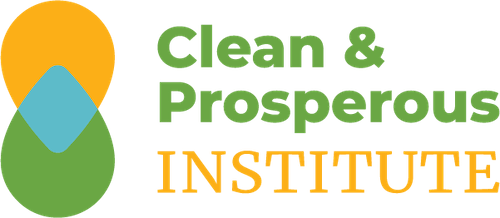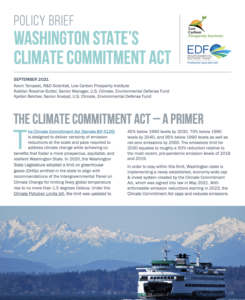Clean & Prosperous Institute
Building Back Better with Cap & Invest
Legislature Adopts Cap & Invest Program
The Institute is proud to have contributed to the development of the Cap & Invest program adopted by the 2021 Washington State Legislature. In collaboration with the Environmental Defense Fund, we created this policy brief to provide a primer on the new law. Explore these pages to read how early Institute work helped contribute to this historic outcome.
The Clean & Prosperous Institute (CaPI) has served as a key source of information and counsel in the development of carbon policy in Washington State for over five years. Our recently published report Building Back Better is a guide for state lawmakers to consider environmental stimulus investments in response to the COVID-19 pandemic.
Based on prior outreach and advocacy, we believe a Cap & Invest program as part of the Building Back Better framework can be a unifying policy for the 2021 Legislative Session and resolve a critical gap in the state’s climate strategy.
We are seeking to broaden the participation of business entities to support this campaign, especially those that have made strong commitments to reduce their own carbon footprints, and those concerned with the health and economic inequities exacerbated by the pandemic.
Here’s why we’re doing this:
- Building Back Better demonstrated that investing a million dollars in a Resilient Recovery Portfolio including clean transportation, forest conservation and ecosystem restoration, clean energy, water and energy efficiency, low carbon agriculture, and sustainable industry supports over 10 jobs full-time equivalent jobs compared to 4.3 jobs from the state’s ten largest industries, and delivers over twice as much in clear air and climate benefits as the cost of investment. These findings can help state policymakers design an economic recovery plan in response to the COVID-19 crisis that maximizes both job creation and the long-term health of Washington communities.
- The COVID-19 pandemic has continued to demonstrate the vast inequities that exist in our state, both economically and in relation to health risks and outcomes. Communities that are most vulnerable are also those disproportionately impacted by the co-pollutants that accompany CO2 emissions and other greenhouse gases (GHGs).
- Voters want something done to regulate CO2, and a strong majority in every Washington county are willing to prioritize it over the economy, if necessary.
- Legislative solutions are likely to produce better vetted bills than public initiatives. In 2019, the Legislature passed the landmark 100% Clean Power bill with broad industry and stakeholder engagement.
- California’s Cap program is out-performing expectations, combining with sector-specific measures to achieve the state’s 2020 carbon reduction goals several years early while the economy expanded at double the rate of the country as a whole. “California is proving that smart climate policies are good for our economy and good for the planet,” said Governor Newsom. Recent research indicates that the program has been consistent with a shrinking “environmental justice gap” and the majority of California Climate Investments, directly funded from Cap auction proceeds, have gone to projects benefiting priority populations.
- The benefits to the state economy of taking action are compelling:
- Most GHG solutions are so effective they return more money than they cost;
- We can dramatically reduce the massive costs of wasted energy; and
- We can balance cost with progress moving to at least 99% GHG-free power before 2050;
- Community health and local economies generate positive return on investment as shown by the Building Back Better framework.
System Requirements & Principles
- Achieve legislatively targeted greenhouse gas emissions at an optimized value that creates jobs and cleans our air.
- Generate investments to stimulate local economies, improve health and climate impacts, with prioritization given to highly impacted communities.
- Improve productivity and decrease pollution exposure by ridding our state of costly waste that results from our status quo energy inefficiency.
- Invest and leverage private financing for activities that reduce operating costs and carbon emissions.
- Facilitate efficient compliance and catalyze innovation by providing businesses with regulatory certainty, robust state-wide market participation, and linking to similarly motivated jurisdictions.
- Harmonize with our existing laws, rules and programs, such as the Washington Clean Energy Transformation Act (2019), and consider sun-setting laws and regulations that are no-longer needed.
We ask
- Work with us as part of the coalition working with the legislature to develop and enact Cap & Invest in Washington state.
- Become a Clean & Prosperous Institute Steering Committee member.

